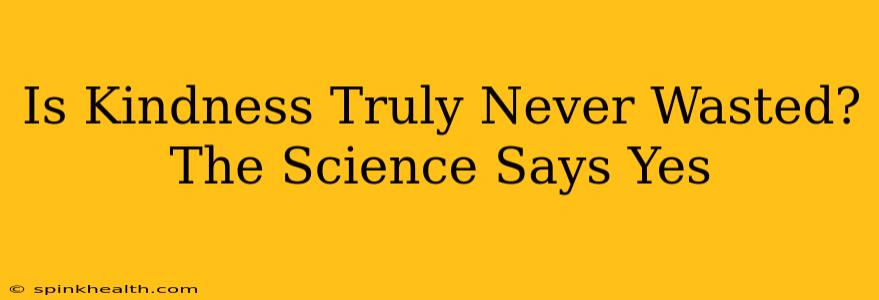The age-old adage, "Kindness is never wasted," often feels like a comforting platitude. But is there scientific backing to this seemingly simple truth? The answer, surprisingly, is a resounding yes. Emerging research across various fields, from psychology to neuroscience, reveals the profound and far-reaching impact of kindness, not just on the recipient, but also on the giver. This exploration delves into the science behind kindness, explaining its ripple effect and debunking the myth that acts of kindness are inconsequential.
What are the benefits of kindness?
Kindness offers a wealth of benefits, impacting both the mental and physical well-being of both the giver and receiver. For the recipient, kindness can reduce stress, improve mood, and foster a sense of connection and belonging. For the giver, the rewards are equally compelling. Studies have shown that performing acts of kindness is linked to increased happiness, reduced stress, and even improved physical health. It's a win-win situation, scientifically proven.
What is the impact of kindness on the brain?
Neuroscience offers fascinating insights into the biological mechanisms underlying the effects of kindness. Acts of kindness trigger the release of endorphins, natural mood boosters that alleviate pain and promote feelings of well-being. Furthermore, kindness activates the reward centers in the brain, reinforcing the behavior and making us more likely to repeat it. This creates a positive feedback loop, promoting a cycle of kindness and happiness.
Does kindness improve mental health?
Absolutely. Numerous studies demonstrate the positive correlation between kindness and improved mental health. Kindness acts as a buffer against stress, anxiety, and depression. By fostering social connection and promoting feelings of belonging, kindness helps combat feelings of isolation and loneliness, significant contributors to mental health challenges. Regular acts of kindness can be a powerful tool in promoting mental well-being.
How does kindness impact physical health?
The benefits extend beyond mental health. Research suggests a link between kindness and improved physical health. Lower stress levels, a consequence of regular acts of kindness, contribute to reduced blood pressure, improved cardiovascular health, and a strengthened immune system. The positive emotional state associated with kindness promotes overall well-being, reducing the risk of various health problems.
Is there scientific evidence supporting the claim that kindness is never wasted?
Yes, the accumulating evidence strongly supports the claim that kindness is never wasted. Even seemingly small acts of kindness can have a significant ripple effect, impacting not only the immediate recipient but also those who witness the act. This positive influence can spread through social networks, creating a chain reaction of kindness and improving the overall well-being of communities. The science is clear: kindness is a powerful force for good.
How can I incorporate more kindness into my daily life?
Incorporating kindness into your daily routine doesn't require grand gestures. Small, consistent acts can make a big difference. Start by practicing active listening, offering genuine compliments, performing random acts of service, or simply extending a helping hand to someone in need. The key is consistency and authenticity. Even a small act of kindness, performed regularly, can have a profound impact on your well-being and the well-being of those around you.
What are some examples of everyday acts of kindness?
Everyday acts of kindness are limitless, and the possibilities are as diverse as the people we interact with. A simple smile, holding a door open, offering a seat on public transport, or lending a listening ear can all be considered acts of kindness. More involved acts could include volunteering your time, donating to charity, or mentoring someone. The most impactful acts are those that come from the heart and are performed without expectation of reward.
How can I measure the impact of my acts of kindness?
While it's impossible to quantify the exact impact of every act of kindness, the positive feedback loop creates its own measure. The joy you experience in giving, the gratitude you receive, and the positive changes you observe in yourself and others are all indicators of the positive ripple effect. Focus on the intention behind your actions, and the impact will follow. The true measure is not in quantifiable results, but in the positive change you inspire.
This exploration of the science behind kindness reveals its profound and far-reaching impact, firmly establishing that kindness is indeed never wasted. It's a powerful force with tangible benefits for both the giver and the receiver, contributing to a healthier, happier, and more connected world. Embrace the science of kindness and experience its transformative power in your own life.

